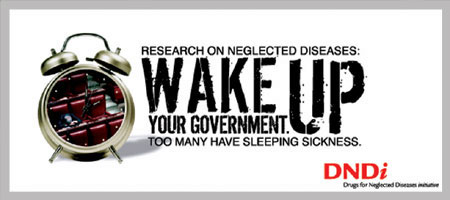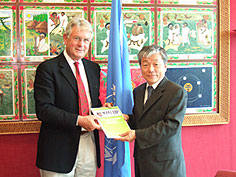 | |
DNDi is a not-for-profit drug development initiative established in 2003 by four publicly-funded research organisations - Kenya Medical Research Institute, Indian Council for Medical Research, Oswaldo Cruz Foundation Brazil, Malaysian Ministry of Health; a private research institute, the Institut Pasteur; an international research organisation WHO's Tropical Diseases Research programme; and an international humanitarian organisation Médecins Sans Frontières. DNDi aims to develop new, improved and field-relevant drugs for neglected diseases such as leishmaniasis, human African trypanosomiasis, and Chagas disease that afflict the very poor in developing countries. It will raise awareness of the urgent need to develop drugs for these diseases and use DNDi projects to strengthen existing capacity in disease-endemic countries. Photo Credit: DNDi | |
 A Growing Momentum: Public support crucial to essential health R&D Bernard Pecoul In May this year, the World Health Assembly (WHA) will discuss the Kenya and Brazil Resolution for a Global Framework for Essential Health R&D, as well as the WHO-commissioned report from the Commission on Intellectual Property, Innovation and Public Health (CIPIH)... 
Call to create global R&D Framework Nicoletta Dentico Several initiatives will present the issue of extensive government support for a new global R&D framework at the World Health Assembly this May. These include the recent report of the Commission on Intellectual Property Rights, Innovation and Public Health (CIPIH)... See also:
| |||||||||||
Tackling the critical question of drug regulation Peter Folb Medical Research Council South Africa At the heart of drug discovery and development lie drug regulation and drug regulatory authorities. The responsibility of the national regulatory authority (NRA) is to ensure the efficacy, safety, and quality of medicines available to the public... UK Grants DNDi £6.5 million The UK's Department for International Development (DFID) has granted DNDi £6.5 million for its R&D of drugs for neglected diseases. In funding product development partnerships such as DNDi, TB Alliance, TDR, for a total of £17.5 million the UK is actively implementing the policies it put forward during its presidency of the G8 and European Union in 2005, and shows real commitment to its policy to make global health a priority. | CIPIH reminds governments of ‘moral imperative’ towards neglected patients The recently published report of the WHO Commission on Intellectual Property Rights, Innovation and Public Health (CIPIH) states that it is the ‘moral imperative’ of governments to set global health prioritie and promote innovation. It recommends over 60 key actions needed to ensure that poor people in developing countries have access to existing and new products to diagnose, treat, and prevent the diseases which affect them most... | ||||||||||
Published by Drugs for Neglected Diseases Initiative - 1 Place St Gervais 1201 Geneva Switzerland
Editor: Jaya Banerji - Tel: +41 22 906 9230 - Fax: +41 22 906 9231 - www.dndi.org
Editor: Jaya Banerji - Tel: +41 22 906 9230 - Fax: +41 22 906 9231 - www.dndi.org
